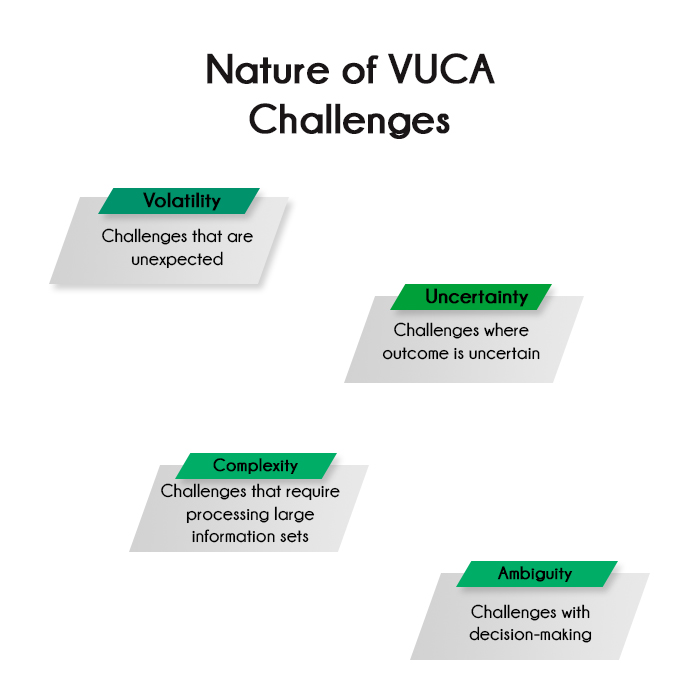
Change is the only constant. This oft-repeated statement holds true now more than ever in the business environment which is the new VUCA world.
In this new VUCA world, Businesses are facing complex new challenges on a regular basis, often from unexpected sources, and are frequently caught unprepared to address these issues. Consider the example of car manufacturers.
For years they competed among each other in various segments of the market; targeting customers to get them to buy their cars. However, with the advent of ride-hailing apps, fewer people are now keen on owning a car. As a result, manufacturers are having to make unexpected changes to various aspects of their business, such as their Design, Marketing, and Sales strategies. For organizations to adapt to these kinds of situations and make changes, they need to be VUCA-ready.
VUCA (Volatility, Uncertainty, Complexity, and Ambiguity) is widely acknowledged by business leaders as the most critical set of challenges faced by their organizations today. Continuous and exponential advancements in technology, along with constantly changing social and political scenarios have been identified as the most significant factors that contribute to the creation of this VUCA world.
A recent survey by Development Dimensions International and The Conference Board reveals that only 18% of Leaders have a strategy to address VUCA in their Organization; and the ones that fail to do so, risk losing ground to their competitors. In order to be VUCA-ready, organizations need to develop strategies that make them more adaptable.
These strategies must be long-term and often require significant changes to how the organization operates and behaves. To formulate a strategy, business leaders must first understand the unique nature of each aspect of VUCA.

Volatility: Challenges that are unexpected or unstable in nature. While there is often enough knowledge to resolve these challenges, being prepared for them when they appear and resolving them in a timely manner is critical.
Uncertainty: Challenges where although the solution is well thought-out, the final outcome is not always as desired. In such situations, having alternative solutions is critical.
Complexity: Challenges where the amount of information and number of variables to be processed are very large resulting in a complex problem statement. These problems require time and analytical skills to resolve.
Ambiguity: Challenges where there is not sufficient prior information to make informed decisions. Such situations require an experimental approach to solve.
Organization leaders must continuously assess whether they are at risk of facing any of these challenges, and take proactive measures to ensure that they are prepared to address them. Given the diverse nature of the challenges, the strategies to be put in place to tackle them must be equally diverse.
These strategies are often unique to each organization depending on a variety of factors such as the scale of their business, or the industry in which they operate. However, there are a few basic principles that are relevant while approaching a strategy for each of these challenges.
Volatility: Strategies to address these types of challenges must ensure that there are sufficient and well-prepared resources to handle situations when they arise. This means, among other things, ensuring that the organization has a robust hiring strategy. For instance, potential candidates must be vetted not just for their technical skills, but also for their ability to learn from and react to situations quickly.
Uncertainty: Strategies to address these types of challenges must ensure that available information is thoroughly analyzed from multiple perspectives during the solution-building process. This should, among other things, involve fostering a culture of collaboration where multiple Teams are comfortable working together towards a common goal.
Complexity: Strategies to address these types of challenges must ensure that the right set of experts and tools are being used in order to take on the task at hand. An organization that wants to tackle challenges of this nature should, for instance, invest in training, identification, and retention of its high-performing Talent, among other strategies.
Ambiguity: Strategies to address these types of challenges must ensure that organizations and its people are flexible in nature and their methods of working. For instance, an organization that wants to effectively deal with these challenges should consider an organizational restructuring strategy that adopts an agile approach towards problem-solving and quickens the process of decision-making.
Organization leaders must keep in mind that creating a VUCA-ready organization is a gradual process that often requires intense cultural and functional changes. This is a critical aspect in the success of any efforts to address VUCA.
If the driving forces behind a strategy lack the necessary understanding and skills to implement it, then it is bound to fail. For this, organizations must ensure that key decision-makers at all levels understand and are able to communicate initiatives and strategies effectively.
While the different challenges of VUCA each require a unique set of skills to implement solutions for them, there are a few basic skills and proven competencies that organizations must ensure its leaders possess.
Clear Vision: Leaders that have a clear vision and understanding of why a certain strategy is being implemented are likely to be successful in executing solutions for VUCA challenges. These leaders continuously seek to align the efforts of their Teams with an overall goal. Such leaders are also more likely to persevere and be patient in the face of adversity, since their overall belief in the purpose of their effort helps them overcome short-term obstacles.
Curious and Receptive: Leaders that are receptive to different perspectives and constantly seek to learn. In a fast-paced VUCA environment, tried and tested methods do not always yield results. A leader must be receptive to new approaches and methods from different sources. She/he must not draw solely on their own experience during the decision-making process
Collaborative Leadership: Leaders that understand the importance of collaboration in a VUCA environment are better placed to succeed. They encourage networks rather than hierarchies and acknowledge that collaboration yields healthier results than competition
Risk-taking: Leaders that are able to make decisions based on a fine balance between their intuition and the most logical solution to a challenge thrive in a VUCA environment. They are more likely to make decisions that are bold and require a certain degree of risk; both of which are often critical requisites in a VUCA strategy
While the nature of challenges, solutions, and skill requirements in this VUCA world will vary from one organization to another, it is imperative that organizations acknowledge that traditional methods of working will now seldom yield desired results.
Given the dynamic and disruptive business environment that we live in today, organizations must take necessary measures and be prepared to adapt to rapidly changing situations to ensure that they continue to thrive and succeed. Investing in the right strategies and people resources are the foundations for the long-term success of an organization.